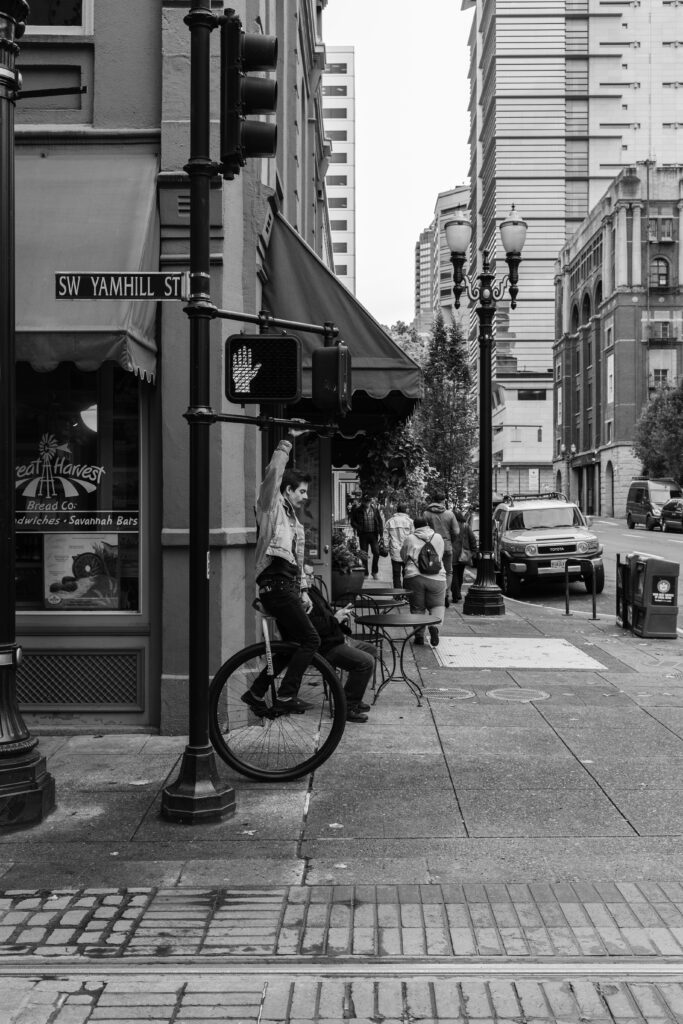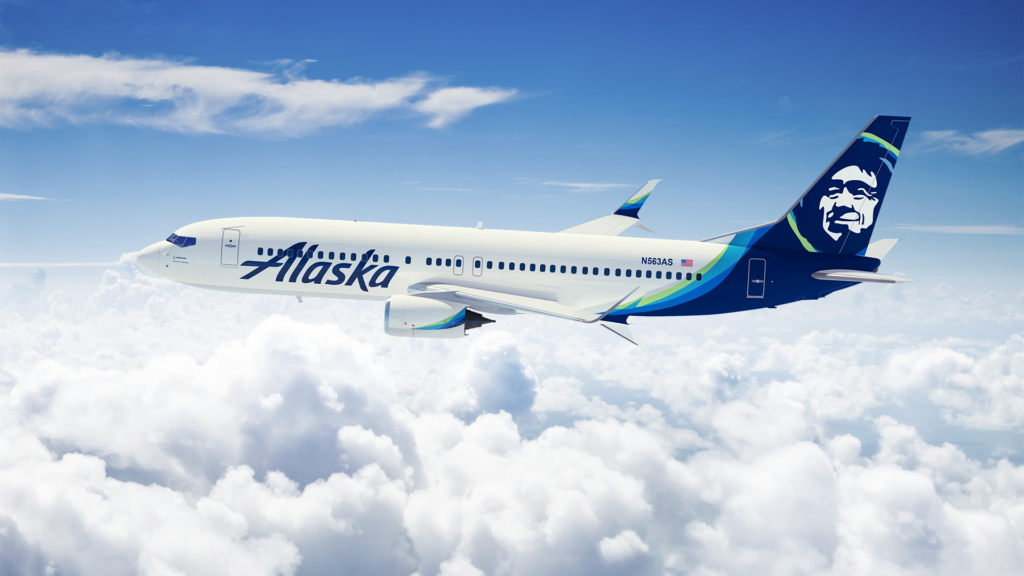Seeing a unicycle in downtown Portland isn’t necessarily unique but yesterday I saw one that was equipped with a mountain bike treaded tire. Guess there’s a first time for everything.
New Delta Airlines Uniforms
Delta Airlines announced that they would be rolling out new uniforms for 60,000 frontline employees. The new uniforms are for check-in and gate agents, flight attendants, and below the wing employees such as cargo and ramp staff.
The uniforms have been described as “high class” and “elegant” by Delta and reporters. And yes, the uniforms are a very nice change, but the hype around them seems a little over the top. I think it gets to me because it simply seems like a distraction from the fact that travel on U.S. airlines in economy has become a rather bleak affair. It is an illusion of fancy in an industry that has become anything but; Basic economy fares and less legroom has become the norm. Yes, I know, fare prices are on the decline domestically, but that comes with the added expense of the ancillary fares, which airlines are attempting to increase.
I think the fancy new uniforms speak to a larger trend in modern consumerism. I don’t mean to go existential but it feels like we’re giving up what matters for what looks good, not just in airplane amenities but in everyday life. Maybe it is time to take a step back and realize that the substance of what we enjoy and cherish is more important than the window dressing.
The Entry Visa Conundrum
Some friends have been planning a trip to Hong Kong for later in October and I dragged my feet when it came to purchasing a ticket so now I am left trying to sort something out semi last minute. I started looking for a United reward and was able to book Portland-Houston-Taipei (3 days) Taipei-Singapore (2 days) then Hong Kong-Chicago-Portland. I will book a separate ticket from Singapore to Macau and then take the ferry over to Hong Kong to spend a few days there before heading home.
I do enjoy Singapore but I have visited before and was actually hoping to visit somewhere new. I looked and found space on a Taipei-Saigon flight. Excited, I started posting the details of my trip on Twitter and my excitement was quickly extinguished. Back in September the visa requirements for US citizens to enter Vietnam changed. The only visa now available is a 1-year multi-entry type. It costs $60 for the visa with a $135 “stamping” fee (that has to be paid in cash to the immigration officer in Vietnam). There is a way around this but it requires entering Vietnam via Phu Quoc island.
For me, $195 for a couple of days in Vietnam when I may not return in a calendar year is difficult for me to justify. I would love to visit Vietnam but with limited time, the cost is restrictive. So where should I go instead? Do I stick with Singapore? Head to Kuala Lumpur or Penang, Malaysia instead? Somewhere else?
If I do end up keeping the reward, I am pretty excited to try out EVA’s Royal Laurel Class, which for Houston-Taipei would be on a Hello Kitty plane.

The $21,000 Airplane Seat
By now I am sure you have seen Casey Neistat’s video documenting his recent experience in Emirates First Class after an upgrade. If you haven’t, I have embedded the video below.
I appreciate that Casey shared the experience via his vlog. Showering at 35,000 feet is one of the coolest features of first class Emirates (and now Etihad). That said, the episode was a little click-baity. The headline is definitely attention grabbing but what is the reality of people paying $21,000 for a first class ticket? The general assumption is that high level executives and the independently wealthy are the ones filling the best seats on the planes and while that might occasionally be the case, for the most part, people are not paying full price.
Airlines can price the first class cabin at whatever they want, the higher the price, the more of an exclusive feel. Behind the scenes though, airlines are discounting those seats for companies that have large corporate contracts and releasing the seats for rewards or upgrades. So yes, there might be a few people out there who actually pay full price for first class, but the reality is that a lot are paying far below the published price you will find on a website.
The video is definitely a great look at Emirates’ first class product and all of its features. Casey didn’t really know why he was upgraded and I wonder if it had something to do with his Boosted Board being confiscated by security at the Sydney Airport.
Edit, not too long after posting this story, Cynthia Drescher clued me in on a great theory of why Casey was upgraded:
@ssegraves he was upgraded bc he released his first glowing video of EK J before his return flight. EK smartly saw the opportunity
— Cynthia Drescher (@JetSetCD) October 2, 2016
Three Big U.S. Airlines – All the Same
Scott McCartney for the Wall Street Journal:
The big three U.S. airlines—American, Delta and United—match each other more closely than ever. The three were created from the merger of six large airlines over the past eight years and now each has the profits to spend upgrading its product. They’re all intent on not letting one rival gain a cost or product advantage.
[…]
Airlines say the similarities just mean they are all coming to the same conclusions about what customers are willing to pay for and what they aren’t. “The market dictates what your product will look like,’’ says Brian Znotins, United’s vice president of network.
Three mergers later and we are just now figuring out that the three remaining major U.S. carriers are basically copying each other. The “race to the bottom” language is appropriate at times but really the carriers are simply competing for the passengers who do not necessarily care who they fly. With the low cost carriers like Spirit and Frontier offering a no-frills experience, the majors are happy to follow suit and charge for the privilege of more legroom or early boarding. The majority of passengers simply want the lowest fare available that fits their schedule, add to that analysts who want to see profits, and you have what is driving airline decisions.
Remember, they are reporting record profits, all while customer complaints increase. The result is a form of collusion by following. The airlines are not meeting in back rooms to decide what amenity should be cut next, instead they just wait for one to cut an amenity and then follow suit. The latest way of trying to compete with low cost carriers like Spirit and Frontier is the basic economy fare. Delta, American, and United are all working to offer a fare that has zero perks, including no pre-reserved seat assignment and no mileage earning. These fares are not necessarily cheaper than fares of the past, but when you compare them to fares that do earn miles they appear cheaper.
This is not a trend that will be changing anytime soon. With new low cost airlines like Norwegian entering the U.S. longhaul market, the reduction of amenities on the three major airlines while charging for perks will continue. It will take a spike in oil prices along with a reduction in travel before anything changes.
Delta Power Outage Causing Delays/Cancellations
Delta Airlines is currently recovering from an outage that delayed and cancelled hundreds of flights around the world.
From their statement on the outage, two points:
Noon ET UPDATE: Delta has canceled approximately 365 flights due to a power outage impacting Delta operations systemwide. As of 10:30 a.m. ET, Delta operated 1,260 of its nearly 6,000 scheduled flights. While systems are improving and flights are resuming, delays and cancellations continue.
5:05 a.m. ET UPDATE: Delta has experienced a computer outage that has affected flights scheduled for this morning. Flights awaiting departure are currently delayed. Flights en route are operating normally. Delta is advising travelers to check the status of their flights this morning while the issue is being addressed.
At first the outage was reported to be a computer outage, whatever that means, and then it was updated to “power outage”. My guess is that a data center lost power, a generator or other backup power system did not kick on, resulting in an outage that continues to linger. What is interesting is that Delta had no problem throwing their power provider under the bus without first figuring out what happened.
There is a travel waiver up and it is in effect until August 12, 2016. My recommendation if you are flying Delta today or tomorrow? Use their app to rebook for another day, go home and wait this out. Even if they start running more and more of today’s flights, this outage will ripple through the system for at least a few days.
Passengers in Anchorage, AK. No communication. Confusion @Delta seems to be hiding from the #ATL power outage #Delta pic.twitter.com/oaXJrmr4LA
— Chad Krockover (@BoilerKrock) August 8, 2016
#Delta "old system" (terminal based) is up and veteran employees still have logins can process passengers pic.twitter.com/7clxAkVgJk
— Joshua McClure (@joshuamcclure) August 8, 2016
At LAX, @Delta passengers on last night's red-eye flights to JFK still haven't departed #Delta https://t.co/4dqjTInCgL
— Alastair Jamieson (@alastairjam) August 8, 2016
.@Delta flights grounded worldwide for more than 4 hours, boarding passes issued by hand https://t.co/2vqkH1Hrrp pic.twitter.com/MmkqLGmIiV
— Alastair Jamieson (@alastairjam) August 8, 2016
Apple’s System Integrity Protection
We bought a new MacBook Pro late last year and I had not run into any issues until yesterday, when I tried to install the LAME MP3 Encoder for use with Audacity. I was in a pinch, needing to convert a *.wav file to *.mp3 for the Dots, Lines, and Destinations podcast. When trying to install the encoder it appeared to work, but on closer inspection, the files were never written to the correct folder. After doing a little research, I noticed that the /usr/lib/local directory was not writable and threw an error when accessed. So, to Google I went. Turns out this is a “feature” and part of Apple’s System Integrity Protection. Basically, it keeps certain directories inaccessible to even root level access to try and prevent malicious applications from modifying things they shouldn’t be touching. The side effect is that when you legitimately need to modify those directories you can’t. I did not have the luxury of time when going through all this and opted to just use an older Mac that did not have El Capitan installed to convert the audio files I needed.
Glenn Fleishman provides a better description of System Integrity Protection, including how to disable it, in his article on Macworld.
Early reports of problems with rootless mode seemed to indicate that a wider set of software might be unable to work with the restriction enabled, such as SuperDuper! from Shirt Pocket Software. However, Apple made changes during beta testing that resolved concerns with that app and others. (Shirt Pocket had to update SuperDuper! to deal with the omission of an open-source program, which breaks scheduled updates; those have to be re-created in the El Capitan-compatible release.)
Use car2go to Portland Airport starting July 1!

car2go, the smart car sharing company from Daimler AG, announced that starting July 1, 2016 you will be able to use their cars to go to and from Portland International Airport. Parking will be at AirPark, a short shuttle ride from the airport. Trips to and from the airport are charged a $5.00 Airport Fee, but even with that, from places all around Portland, this is now a really cheap and convenient way to get to and from the airport. The real beauty of car2go in Portland is that they can be parked anywhere within the boundaries of the program, even paid parking spots.. And since they are small, it is really easy to find spots. Since paid parking is in downtown Portland and expanding to Northwest and the inner east side, the ability to park in these spots (for free) is a great feature.
The biggest downside is the off-airport parking area. It would have been great if the short term parking garage would have been the parking area, as you could simply walk out of your car2go and be in the terminal. I don’t know if a deal could not be reached with the airport or if the parking situation there is too constrained to allow for it.
I will try to get out there and document the process and how quick the shuttles are as soon as this comes online and would love to hear what people think of it when they use it.
You can read more about car2go parking and the new airport features on their website. The press release sent to members regarding airport parking is also available.
Alaska Airlines adds new service between Portland, Oregon and Orlando
Alaska Airlines announced today that they will start non-stop service between Portland, Oregon and Orlando, Florida. The route will start in March of 2017 and will be a daily service. What is interesting, and a great feature, is that both the outbound and return flights will operate during the day, meaning you don’t have to a take a red-eye to get to Florida.
The Portland to Orlando segment will leave at 6:40am Pacific and will arrive in Florida at 3:15pm Eastern. The return Orlando to Portland flight will leave at 4:15pm Eastern and land in Portland at 7:35pm Pacific.
As a resident I am happy to see more growth at Portland but I worry that the airport facilities are not growing at the same pace. The Alaska Airlines side of the airport is very crowded but that will be changing in the future as Alaska move their operations to the E gates on the opposite side of the airport.
Big thanks to Seth for giving me the heads up the announcement.
A Portland Sunset
The last week of storms have had amazing sunsets accompanying them. This one was particularly breathtaking, the clouds created a shadow over where I was taking the picture and completely backlit the hills you see in the distance. The deep orange and yellow were just too amazing to not take a photo. This was taken on my iPhone but I even ran back inside and loaded the battery and memory card in my DSLR camera and was able to get a few good shots with it as well.







